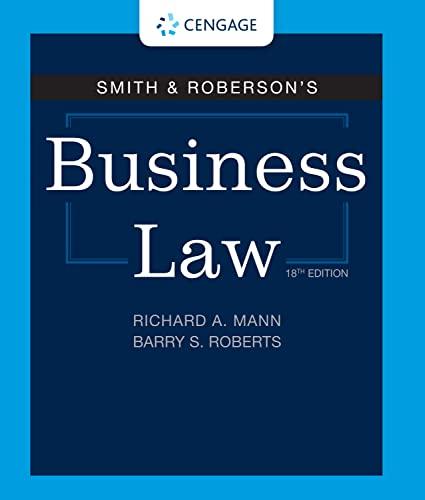Question
1. Reply to the comment below saying why you agree. I think that Mr. Browder's right to a speedy trial was violated. He did not
1. Reply to the comment below saying why you agree.
I think that Mr. Browder's right to a speedy trial was violated. He did not deserve to be imprisoned for three years. It is the law enforcement's duty to make sure defendants are not detained in pretrial detention for prolonged periods of time. The officers couldn't find evidence of him robbing when they made the arrest. There were no weapons on Browder's person. After Browder was imprisoned, the officers still couldn't find anything to convict him of robbery. He should have been let go very early on because there was no evidence indicating that he robbed anyone. Last week, we discussed how certain people need to be held in prison until their trial because they could be a danger to society. In this case, I think once they couldn't find anything on Browder during the time of his arrest that it proved he wasn't a danger to society. He did not need to be detained as long as he was. The justice system failed him. Another thing that truly shocked me about his story was that he was only 16 years old. He was a juvenile. I feel like this brings up a new issue on how we should take care of juveniles in the justice system. Another issue I have with this case is how they treated him so horribly in the prison. He was beaten up by guards, other prisoners, and sent into solitary. I feel like his punishment was incredibly excessive and harsh for someone so young. This case has brought up many issues that our justice system needs to address such as, whether or not juveniles should be detained prior to trial and creating guidelines for a speedy trial.
2. Reply to the comment below saying why you agree.
I believe Mr. Browder was wrongfully imprisoned and denied his right to a speedy trial. Kalief Browder and his friend were accused of robbing a man, when the officers stopped to interrogate them they were not resistant and even told the police officer to check their pockets. When the police officer checked their pockets he found nothing. Browder recalled one of the officers going back to the car where the alleged victim was and when he returned he had a new story. The new story was that the man said they robbed him two weeks ago, not a night ago. The police handcuffed them and put them in the back of a cop car and didn't tell them what they were being charged for. They were minors at the time of the incident, the parents should have been called. After being held for seventeen hours, they finally charged Browder with robbery, grand larceny, and assault. They set bail for Browder at three thousand dollars which was out of reach for his family. Browder was sent to Rikers Island. Due to the fact that Browder's family couldn't afford to hire an attorney, they were appointed one. The attorney assumed that the case would be smooth sailing and straightforward because there wasn't any evidence, just the alleged memory of the victim. After Browder's initial arrest, it took three years for the court to finally realize there was no real evidence tying Browder to the crime. His Fifth Amendment right to a speedy trial was violated. There was no evidence connecting this seventeen-year-old to the crime and yet he was forced to wait on Rikers Island. This was a system failure.
Step by Step Solution
There are 3 Steps involved in it
Step: 1

Get Instant Access to Expert-Tailored Solutions
See step-by-step solutions with expert insights and AI powered tools for academic success
Step: 2

Step: 3

Ace Your Homework with AI
Get the answers you need in no time with our AI-driven, step-by-step assistance
Get Started


